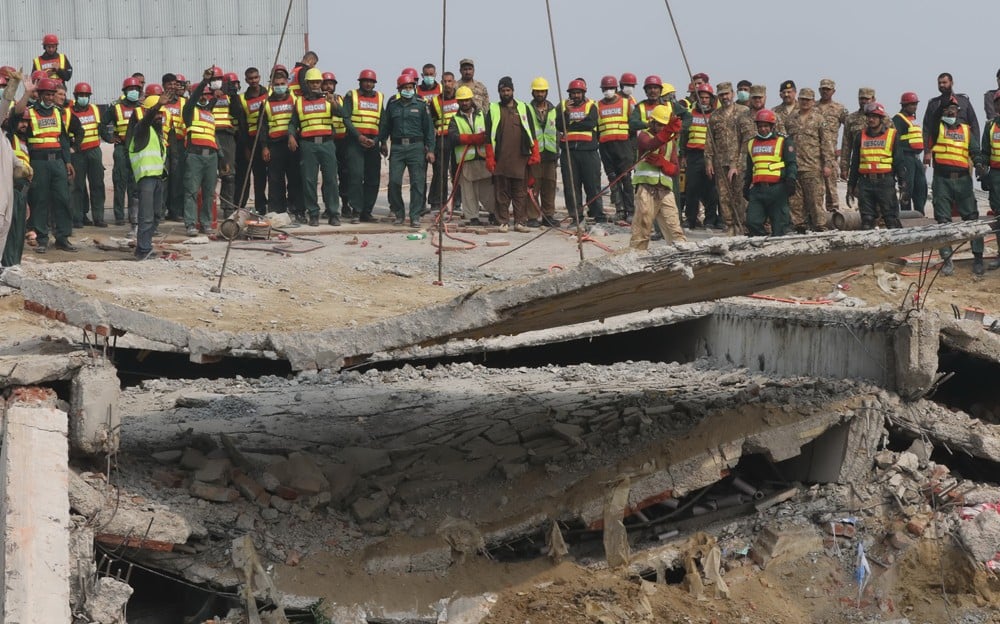
Occupational health and safety laws need to be updated and properly implemented

Yet another factory building collapsed in Sundar Industrial area Lahore on November 4, 2015, killing over 50 labourers. Occupational health and safety laws and their implementation remains one of the indicators to differentiate between developing and developed countries.
Most countries in Asia show a poor record on adherence to health and safety laws and standards. The comparative data on global fatal accidents by region reveals that as compared to North America and Europe, the fatality rate is as much as three times greater in the developing world. International Labour Organization’s (ILO) maintains a country profile on occupational health and safety at country and regional levels.
In the context of Pakistan, the issue of health and safety laws and regulations came into limelight with the tragic accident of Karachi garment factory fire on September 11, 2012. The fire killed 260 women and men, and 1000 workers lost their jobs. However, not much has changed since then except a verbal commitment by the government of Sindh to seek International Labour Organisations’ help to improve health and safety regime.
Earlier this month on October 10, 2015, eight labourers were buried under the debris while operating an illegal stone crushing plant in Taxila, Punjab. In the last two months, at least three accidents show the urgent need for occupational health and safety to be taken seriously.
Globalisation and race for achieving higher economic growth are some of the factors which discount the significance of health and safety laws and regulations and their implementation. In neighbouring China, the incidence of Tianjin warehouse explosion demonstrates that health and safety laws and their implementation remains a challenge.
A similar incidence occurred in India on September 12, 2015 when some explosive material blasted in a restaurant near Petlawad, killing over 100 people.
Occupational safety and health administration is the area which is required to be developed in Asia. The governments in the region cannot overlook its importance now when the scale of industrial operations are increasing. Certainly, lessons can be learnt from the experience of developed and developing countries which have overcome these issues.
The Occupational Safety and Health Administration Agency (OSHA) of the United States Department of Labour ensures safe and healthy working conditions for working men and women by setting and enforcing standards and by providing training, outreach, education and assistance. According to Bureau of Labour Statistics, incidence of total work injuries in 2013 was 3.3 fatal work injuries/100,000 workers. In the year 2006, the incidence was as high as 4.2 fatal work injuries/100,000 workers. Malaysia reduced its fatal injury rate to 9.2 fatal occupational injuries per 100,000 in 2013. Earlier this year in April 2015, Netherlands signed an agreement with the International Labour Organisation head of Pakistan to provide technical assistance to the country to strengthen its labour inspection system.
In Asia, steps are needed to be taken by governments, trade unions, private sector and civil society organisations. Governments need to be proactive to introduce and update laws of health and safety. In case of Pakistan, the occupational health and safety legislation is not comprehensive.
For example Factories Act 1934 is outdated and not applicable to the enterprises employing less than ten workers. Further, it excludes the legal protection to the labourers working in the informal sector such as house-based labour and agriculture/seasonal workers.
Among other factors that hinder the adoption of occupational health and safety culture in Pakistan are illiteracy, inadequate medical facilities and lack of reliable data of fatal accidents suffered by workers each year. As a result of the 18th Amendment in 2010, the federal government had devolved its power of labour legislation to the provinces. However, the provinces are yet to accord provincial status to these laws except Khyber Pakhtunkhwa which passed a Khyber Pakhtunkhwa Factories Bill on March 19, 2013.
Given the ‘Generalised System of Preferences (GSP) Plus’ status, giving Pakistani products duty free access to the European market since January 2014, there is hardly a choice to delay updating and implementing occupational health and safety laws. In order to continue to enjoy the GSP plus status, adherence to labour safety laws is a critical factor.
It is the duty of people living nearby or employees working on sites to report unlawful activities observed on work places. Such employees known as whistle-blowers should be protected under law. We as individuals must play our due role. We pass by many construction sites where we see labourers working with bare hands handling skin damaging compounds like cement and hanging by rooftops without helmets and safety shoes. Many a times, we have an electrician at home who works with live wires without wearing rubber gloves and boots. We must educate ourselves on occupational health standards in our domain and must insist on following these standards in our circle of influence.
Last but not the least, training in workplace safety especially to the workforce dealing with perilous materials should be made mandatory.